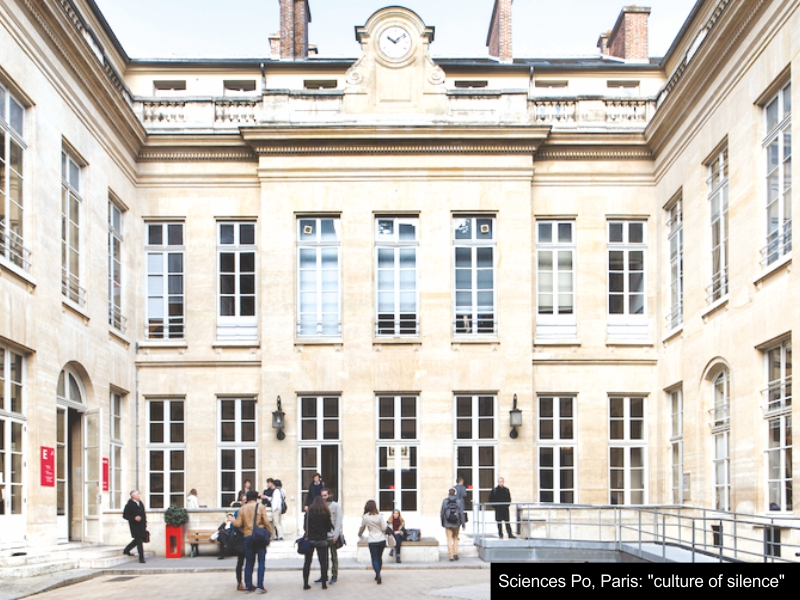
In December 2019, the French investigative journalist Iban Rais was in the student bar of ESSEC Business School, consistently ranked as one of the leading institutions of its kind in the world, when he saw something that shocked him. Looking down over the bar was a stuffed deer’s head, a hunting trophy nicknamed Big Buck. Except it was almost impossible to see Big Buck, because the deer was covered in female students’ underwear. “You could not even see the nose or the head,” he recalls.
Several students told Rais, who is soon to publish a book about sexual assault in elite French universities, that during raucous parties, bartenders would stop the music and halt serving drinks until female students had thrown their underwear over Big Buck.
In the past month, a dam has broken in France, with hundreds of students coming forward on social media to share stories of sexual harassment, assault and rape on campus, particularly at Sciences Po in Paris, the grande ecole that is a training ground for the country’s political elite, and a separate network of institutes of the same name spread across the rest of the country.
France is obviously not unique in facing a reckoning over sexism and sexual violence on campus, nor is the problem confined to its most prestigious institutions. In the US, for example, the 2015 film The Hunting Ground traced the story of rape victims – and their struggle to be taken seriously by university officials – on campuses there. French elite universities, meanwhile, do not deny a problem exists, but insist that they have been working to tackle it for years.
But critics say the grandes ecoles’ extreme elitism and dominance of top jobs in politics and business — which is so notorious that it prompted president Emmanuel Macron in 2019 to promise to shut down one school in response to the “yellow vest” protests — plus their obsession with reputation and, in some cases, private legal status, has made the problem worse. “It’s a huge wave that’s coming,” says Rais. “I think in France, it’s worse than in other countries because of the culture of silence.”
Quantifying the scale of sexual violence on French campuses is hard, but the numbers that do exist are troubling, to say the least. After Rais published an exposé in January 2020 alleging sexual violence and homophobia at three of the country’s top business schools — HEC Paris, ESSEC and EDHEC Business School — more than 500 students and graduates signed a petition saying they had suffered under the culture he described. For his upcoming book, he spoke to about 20 victims of sexual assault or rape from these three schools.
A more comprehensive overview comes from the Student Observatory for Sexual Violence in Higher Education, set up two years ago by Iris Marechal, a Masters student at HEC, after she sensed an “omnipresence of sexual violence” at the business school, with “sexism in classes” and “sexual assault during parties”.
One in 20 students has been raped, and one in ten have been victims of “sexual violence”, which ranges from verbal harassment to groping, according to an online survey that drew more than 10,000 responses countrywide. Two out of three perpetrators were male, a proportion that rises when alcohol is involved. An online survey is not representative, but Ms Marechal says the figures tally with surveys conducted by the government.
Critics say elite universities have simply failed to take the problem seriously, fearful of reputational damage. “They are obsessed with rankings,” says Rais. “It would destroy the beautiful image that they try to build.”
(Excerpted and adapted from Times Higher Education and The Economist)